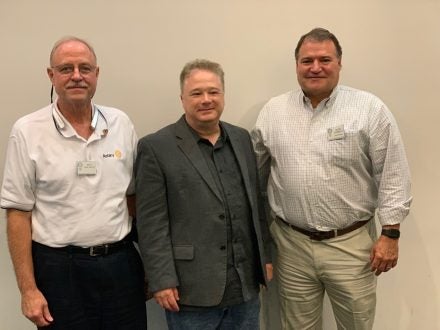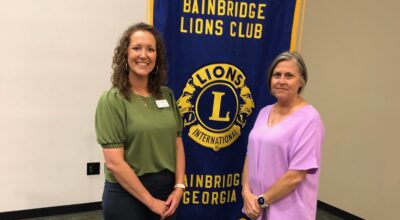Rotary Club hears about Mental Health issues
Published 3:07 pm Tuesday, August 20, 2019

- : Bainbridge Rotary President Dick Youmans is with Tuesday’s speaker, Chris Beam (center) who was introduced by Rotarian Mark Hanna program chairman.
Samaritan Counseling Center has grown significantly over the past 12 years, as reported by Executive Director Chris Beam, who spoke to Rotary this week.
They have gone from 600 counseling sessions the first year to 3300 this past year. It has become a strong source of help for those dealing with a variety of mental health issues. These include anxiety, depression, PTSD, OCD, ADHD, parenting and family issues. “We have a strong need in Southwest Georgia for addressing mental health,” said Beam. In the state of Georgia there is a ratio of 1000 people to every one counselor, while in Southwest Georgia that rate goes to 3400 patients per every mental health worker. Nationwide there are roughly 18 million people suffering from depression and/or anxiety; “Yet we know it is all under reported,” Beam says.
People will always reach out for other medical issues; but there is great reluctance by many to seek help for emotional or relationship issues. “There are 2.3 million people in Georgia dealing with mental health issues,” said Beam, who encourages all to be aware and reach out to those people they interact with each week, and recognize the signs of anxiety or depression they may be feeling.
Beam says we name mental health disorders after our feelings. “It is so much more than emotion. It affects all you do. If we think it, we do it, and the more we think it we do it; and it keeps going round and round,” he explains.
“Depression affects your sleep, either making you sleep too much or too little. The same goes with appetite. With anxiety you feel stress that affects your physical functions and your relationships with others. You may pull away from others who are happy; and it all feeds on itself.”
People begin asking themselves “Why – why me?” What is the purpose and meaning on all levels?
Beam suggests asking yourself first: Is it the truth? Are the thoughts lining up and making sense? He says it is all so integrated.
He advises the only thing you can’t change is emotion. But, if you start thinking and talking about something then you begin to feel it. He used anger as an example.
If you are told to feel angry, you cannot feel it until you start to think about something that upsets you. Then you begin to feel angry and it tells all things physical to react. The question becomes “Can I change my reaction to it?”
He asked Rotarians to perform a breathing exercise with him. Breathe in through your nose and hold it to the count of 3; then breath out through your mouth and repeat the procedure. Or start counting backwards beginning at 999. You become so focused on the counting that you feel the change.
Because Samaritan Center is a 501C-3 not for profit agency, and subsidized by the community, they are able to provide mental health counseling even when there is no insurance available, or people just cannot afford it.
Beam was asked by a Rotary member if they see someone they feel is going to be harmful to self or to others do they do anything about it.
Beam replied that all of their sessions are confidential, but there is an exception for one perceived to be a danger. That can be reported to law enforcement for them to continue investigation and take any appropriate action.




